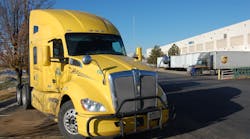I’m as guilty as anyone in terms of predicting the demise of the small motor carrier – overlooking, as many in trucking do, that 90% or so of the fleets in this industry operate six or fewer trucks, while 97% or so operate fewer than 20 trucks.
And while there’s been a lot said regarding the reluctance of small carriers to adopt electronic logging devices (ELDs), with many interpreting such “regulatory reluctance” as yet another sign that truck capacity may exit the market next year.
“Even with all the issues associated with the current regulations and additional regulations in the pipeline and even with the incoming Trump administration likely to be considerably more trucker-friendly, the evidence continues to mount that small carriers are significantly disadvantaged vis-à-vis the larger carriers,” argued John Larkin, managing director and head of transportation capital markets research at Stifel Capital Markets, during a recent conference call.
“Even a delayed, downsized onslaught of less onerous regulations will be challenging for small carriers to cope with – especially if the ‘Beyond Compliance’ initiative gains traction with shippers and brokers,” he added.
“So with fundamentally higher costs, costly outsourced sales and marketing to brokers, and challenges in coping with more numerous and more complex regulations, we believe that the ongoing industry consolidation will continue and that large carriers will be better and better positioned to capture market share, as time goes on,” Larkin concluded.
But is all of that really true? Will the “small players” really toss the keys on the table and quit trucking in droves as the ELD implementation date draws nigh?
One industry stalwart who doesn’t think this will happen – at least not on the scale others are predicting – is Tom Sanderson, CEO of third party logistics firm Transplace; and for some pretty surprising reasons, actually.
“I personally think that small truckers are the industry’s best entrepreneurs,” he told me recently. “And it’s hard to imagine they’ll all completely get out of the industry. Yes, at the end of the day with new technology and regulations, there will be disruptions but they won’t be long term.”
Sanderson explained that while “frustration” may drive some small carriers out of trucking, the counter argument this: many truck drivers are in their mid-fifties and it’s hard to change careers at that point in life and especially in today’s economy.
“There are just not many other places you can go to make $50,000 a year or more at middle age without having other experience,” he stressed. “Now, I’m not saying that they [truck drivers] are overpaid, not by any stretch of the imagination. But look at the jobs available now: they are mostly part-time jobs. The real demand is for engineers and from the science and technology fields.”
More importantly, in his view, are the longer-term trends. “When the industry got deregulated in 1980, so many things were done to improve the efficiency and productivity of the industry,” Sanderson said. “But now, nothing on the regulatory horizon improves productivity – it adds up to fewer miles per truck per year. So we’ll need more trucks and more drivers.”
Todd Spencer, executive vice president of the Owner-Operator Independent Drivers Association (OOIDA), also thinks the obituary for “the small guys” is being written way too soon – though he stressed to me quite strongly in an interview that the road ahead won’t be a happy one for them.
“The small guys, they will adapt; they will modify how they do things. But bear in mind we are talking about the ones who know what to do,” Spencer explained. “Going forward, the real joy of working in this industry is dissipating – that’s what drives a lot of them to be in this business.”
He added that the industry is also beginning to experience economic dysfunction, where there really isn’t any payback from regulation for the small guys, even the drivers.
“We also have too many trucks; we have overcapacity. Certainly shippers recognize that and are taking the full benefit of it,” Spencer noted.
None of that paints a pretty picture for any trucker, large or small, right now. But if Transplace’s Sanderson is correct about the “entrepreneurial spirit” of the small trucker – and I think he is – a combination of time and higher rates may be all that’s needed for them to develop new and better ways to haul freight.





